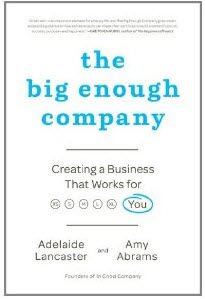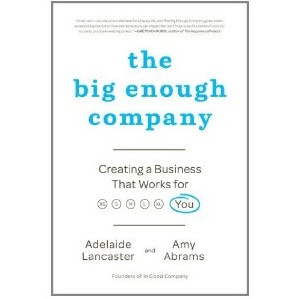Is a larger business always a better business?
As a newly minted MBA my first job back in 1997 was as a buy-side equity analyst. My task was to evaluate the financial prospects of publically traded companies and make recommendations as to whether or not their stocks should be bought or sold. This was back in the heady days of the internet bubble years when double digit revenue or profit growth was scorned upon. The prevailing wisdom: Who wants 15% growth when there are dot coms generating 150% growth?
I never quite got that obsession with size. Wearing my analyst hat all I could think when I saw a rapidly growing company were the pitfalls. How would they handle the logistics, the infrastructure, the accounting of such a sprawling concern? Back then my aversion to rapid growth for the sake of growth made me an investment outlier.
 Today – a breath of fresh air arrives. It’s in the form of a delightful new book by Adelaide Lancaster and Amy Adams called The Big Enough Company. It’s a marvelous guidebook that helps entrepreneurs to “build a business you enjoy running without caving under the pressure to grow.”
Today – a breath of fresh air arrives. It’s in the form of a delightful new book by Adelaide Lancaster and Amy Adams called The Big Enough Company. It’s a marvelous guidebook that helps entrepreneurs to “build a business you enjoy running without caving under the pressure to grow.”
So if you are an entrepreneur, want to be an entrepreneur, or love an entrepreneur… read on. Adelaide was kind enough to answer some questions about the financial implications of choosing to be a “Big Enough Company.” Oh – and here’s the book trailer, I double dare you to watch and not be moved!
(1) What are the most common financial issues you see entrepreneurs struggle with?
Entrepreneurship is ripe with “financial issues”, as entrepreneurs are constantly negotiating investment (money, time, commitment, sacrifice, etc.) and reward (money, satisfaction, freedom, meaning, etc.) Most entrepreneurs learn many of the same classic financial lessons (often the hard way), such as understanding the value of their time, what their product or services are worth, and the very real difference in revenue versus profit. However I’d say the three most problematic and persistent financial challenges are the following:
- Shorting themselves in favor of the business. Entrepreneurs often take better care of their business finances than they do their personal finances. We’ve heard lots of stories of incurring major personal credit card debt and foregoing a salary. Even when it turns out okay in the end, we get concerned about the setting the wrong precedent and potentially fostering underlying feelings of financial insecurity or resentment. There is a big difference between making a significant investment in your business and putting yourself at significant financial risk for your business.
- Fear of growing because of the expenses involved. A major deterrent to growth is fear of the expenses involved, not just the short-term growth expenses but the ongoing operating expenses too. It’s a reasonable enough concern. However we’ve met lots of entrepreneurs who would actually be more satisfied with a bigger business but stay small because of their expense aversion. In these cases, expenses are not a good enough reason not to grow. Unfortunately, if you want to grow your company to be bigger you almost always have to experience the increased expenses before you experience the increased income.
- Getting the right amount of money to bridge growth gaps. It’s often difficult to find ways to access the $10-50k range that lots of businesses need in order to make it to the next level. It’s short of a formal capital investment, but often bigger than early lines of credit and small loans. We are interested to see how a few newer peer-to-peer investment and lending models might change this.
(2) What are some of the financial benefits that can come from deciding NOT to grow your company bigger?
Ironically, we’ve met lots of entrepreneurs whose take home pay ended up being more with a smaller company than it was with a larger company because of the extraordinary overhead involved. Assuming you can support yourself with your company as is, I think that money alone is a bad reason to grow. Instead, consider your motivations for becoming an entrepreneur (what were you after in the first place), how you like to spend your time (i.e. what is your ideal job), and what you want your company to be known for (not all goals are equally accomplished by small and large companies). I know it can sound cliché but it’s harder to make money when you’re miserable, especially when something very important to you (creative freedom, autonomy, the right role, or the right impact) is being compromised.
(3) What are the most frequent issues you’ve noticed entrepreneurs grappling with when it comes to the “values” versus “monetary benefit” trade-off?
Contrary to some stereotypes, most entrepreneurs aren’t in it for the money. If the goal was to make as much money as possible, many say they wouldn’t be entrepreneurs. Instead it’s the allure of freedom, autonomy, and meaning that often motivate them to strike out on their own. However, even our clients who were primarily motivated by money often make choices that result in less income in favor of other values – business related values such as an ethical company culture, or socially responsible business goals, and also more personal values such as outside of work time, extracurricular hobbies, and family.
The experience of being an entrepreneur makes you understand the quantifiable value of your values. You are constantly making decisions about what is worth it. You also learn that not all dollars are equal. For example, a new client could present a huge sales opportunity but require a significant values compromise. Anecdotally, in these cases most entrepreneurs choose their values and believe in their ability to cultivate other more congruent business opportunities. It takes some time to have this kind of confidence but most entrepreneurs learn that the “right” business opportunities don’t require a huge compromise on either front.

